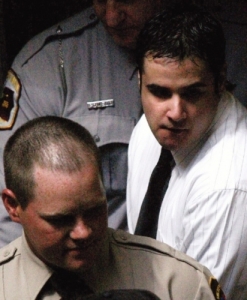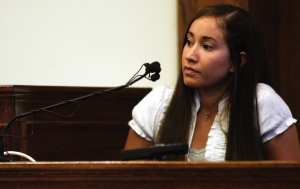Laurean case: Defense takes over
By Kenneth Fine
Published in News on August 19, 2010 1:46 PM

News-Argus/MICHAEL BETTS
Ex-Marine Cesar Laurean, right, leaves a Wayne County courtroom Wednesday. After the prosecution rested its case in Laurean's trial on charges that he murdered Lance Cpl. Maria Lauterbach, two defense witnesses were called to the stand. Laurean's defense team is expected to begin presenting its case in earnest today.

Marine Cpl. Taina Robles testifies for the defense Wednesday. Ms. Robles described the victim, Ms. Lauterbach, as an "habitual liar."
A forceful blow to the left side of Lance Cpl. Maria Lauterbach's head would have caused her to lose consciousness immediately.
Then, after a heartbeat or two, she was likely gone.
Dr. Thomas Clark III told those inside Courtroom No. 1 how the victim in the first-degree murder trial of ex-Marine Cesar Laurean died, as the prosecution, after his testimony, rested its case.
But before the expert pathologist took the stand Wednesday morning, the state questioned an FBI special agent about the manhunt for Laurean that took place in the hills of Mexico.
Steve Kling told the court he was the American agent charged with crossing the border to bring the defendant to justice in April 2008, months after Ms. Lauterbach went missing.
He testified that on April 9 of that year, he met with Mexican officials, who provided him with six officers to help him search for Laurean in a location about 10 hours from the U.S.-Mexico border -- a town where a pay phone and a cyber cafe, they believed, had been used by the defendant to contact family members.
After locating the phone and cafe that day, they set up surveillance, but after seeing no signs of Laurean, left the site at 9:30 p.m. to greet NCIS agents at a nearby airport.
The following day, Kling told the court, the team decided to become "more aggressive" in its search for its fugitive -- asking owners of the nearby shops if they had seen him.
The agents were informed Laurean had been residing in one of the small towns a few miles away, so the team traveled there and tried to meet with the "village elder."
But as they waited, Kling continued, they saw Laurean approaching.
"At first we weren't sure it was him," the agent said. "He was a lot thinner ... had a beard, a baseball cap."
As the man got closer, however, they made what they believed to be a positive identification of the fugitive.
And so, Kling said, they gave chase.
Moments later, Laurean was apprehended.
"He lifted up his shirt sleeve and there was the tattoo," Kling said. "A very distinct phoenix tattoo."
But the man acted confused -- talking in Spanish, saying things like "What's going on? What's happening?" the agent told the court.
Kling testified he responded, "Cesar, your tattoo doesn't lie. You're caught," and, ultimately, Laurean was taken into custody and accompanied to Mexico City to await formal extradition back to the U.S.
During cross-examination, Kling confirmed for defense attorney Dick McNeil that he received information about Laurean's location by using analysis of phone calls and the Internet.
Prosecutors then called their final witness, the man who performed the autopsy on Ms. Lauterbach's charred remains.
A senior pathologist at the N.C. Office of the Chief Medical Examiner in Chapel Hill, Clark told the court just what he and his staff found.
And then, using photographs to tell the jury the story of how the victim died -- the defense objected to use of the photos, but Superior Court Judge W. Osmond Smith ruled "the fact that they are gruesome, does not make them inadmissible" -- he testified about just what happened to the pregnant Marine.
"We were left with a charred body that was also decomposed," Clark told the court.
And examiners were also given a fetal hand, piece of skull and a mixture of dirt and bone fragments.
Clark then testified that "the injuries include a complex skull fracture on the side of the head."
But there was also a "superficial" wound on the neck -- a four-inch cut he believes was left by a "knife or knife-like object."
Ms. Lauterbach's death, however, was not caused by the neck wound, he said.
"Death was a result of blunt force injury to the head," Clark said. "A blunt force is one that is made by a heavy object that does not have a sharp edge."
Like a crowbar, he conceded to prosecutors, after handling the crowbar SBI analysts confirmed Wednesday had Ms. Lauterbach's DNA on it.
"I believe this object could have caused the injuries I saw," he said, holding the tool.
Clark then paced along the jury box, using photos characterized as "graphic" to show the skull fractures he found during the autopsy.
"The heavy object itself would have been in contact with the left side of the head and been able to produce the fracture and would have put lateral force on the skull," he said. "It would have happened at the same time with the same blow."
And when asked how long Ms. Lauterbach might have been able to live after sustaining such an injury, Clark said she clearly had little time left.
"She would have lost consciousness immediately after the blow," he said. "There was maybe a heartbeat."
During cross-examination, McNeil asked Clark about the process of documenting his findings.
The examiner then told the court because of the cold temperatures during December 2007, "a body that is refrigerated, doesn't change very much over time," and the date of death could have happened between Jan. 14 and Jan. 28 of that year.
Clark also rejected McNeil's claim that the injury could not have come from the crowbar because it has a sharp tip.
"It's not sharp," he said, holding his hand down on the spot where Lauterbach's DNA was found. "I'm applying quite a bit of pressure right now and it's not sharp."
After Clark stepped down, the state rested its case.
But it would be several hours until McNeil would begin his defense.
Just after 2 p.m., Smith told the jury there were two facts the state and defense agreed to: DNA samples were seized from Laurean and used for a paternity test and the defendant is not the father of the unborn child.
McNeil then called the defense's first witness, Cpl. Vivian Martinez, who told the court she was stationed at Camp Lejeune and was Lauterbach's roommate for several months in 2007.
Her testimony was short, as after she confirmed she never saw the defendant and victim together, she was asked to step down -- the prosecution had no questions.
And they had no questions for the final witness to take the stand Wednesday either.
Marine Cpl. Taina Robles testified she knew Ms. Lauterbach well -- the two were at bootcamp together and were both stationed at Lejeune.
And she told the defense she was aware of strife between the victim and her mother, Mary, one that existed because the two disagreed on whether or not the pregnant Marine should keep her child or give it up for adoption.
Ms. Robles then testified she saw Ms. Lauterbach Dec. 14, 2007, and described her to the court as seeming "distraught and upset."
And before she stepped down, she characterized the victim as a "habitual liar."
McNeil was expected to resume his defense of Laurean this morning.
